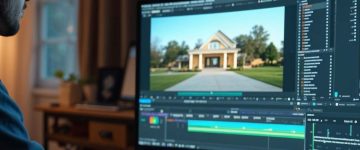- Real estate video content, including walkthroughs, drone shots, and virtual tours, has become central to listings, investor pitches, and lead generation.
- Existing property video editing processes are too time consuming for high-volume production. In-house teams are overwhelmed by manual labor, channel-specific requirements, and tight turnaround times.
- Artificial intelligence and automation speed up real estate video editing and scale up the production of high-quality videos that increase engagement and property sales.
Table of Contents
- The growing importance of property videos in real estate
- AI and automation in video editing
- The role of AI and automation in real estate video editing
- Top 5 benefits of leveraging AI and automation for real estate video editing
- The role of human expertise in the age of AI and automation
- Trends in AI and real estate video editing to watch
- Conclusion
Real estate video editing automation has taken center stage in marketing channels in the property industry. From walk-throughs and drone footage to 360-degree virtual tours, video is the backbone of listings, investor presentations, and lead generation across all digital platforms. With competition heating up, real estate companies are struggling to produce video content at scale to meet the growing demand for immersive, detailed property visuals.
This volume and variety have put pressure on traditional video editing workflows. Real estate companies are already dealing with the downsides of manual video editing and time-consuming processes that require frame-by-frame adjustments for stabilization, lighting, color correction, transitions, overlays, and more. In-house teams are limited by infrastructure and resources and need to create custom content for multiple channels—website, social media, mobile apps—and that adds to the delivery timeline.
Property video turnaround time is now a competitive differentiator. The old video editing process cannot keep up with the speed and scalability that real estate businesses are looking for. High volume video production requires streamlined post-production cycles without compromising visual quality or brand consistency.
AI and automation are redefining the property video editing pipeline by automating repetitive tasks, generating video faster, and achieving new levels of precision in real estate video editing.
The growing importance of property videos in real estate
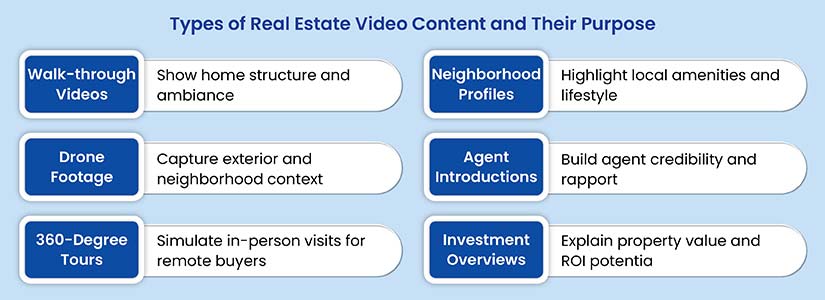
Property videos have become a core asset in real estate marketing. They drive both buyer engagement and lead conversion. There is ample data proving that property listings with videos generate more inquiries, retain viewer attention longer, and also shorten the sales cycle. As against static images, property videos undoubtedly help potential buyers visualize the property layout more accurately and assess usability through spatial awareness, flow, and scale.
However, the effectiveness of real estate videos depends largely on post-processing and editing quality. Property videos with poor visuals, shaky footage, or subpar audio undermine the credibility of both the property and the realtor. Today’s online property buyers expect seamless transitions, clean color grading, and videos optimized for mobile and social media platforms. This makes it crucial for realtors to invest in high-resolution, well-edited video content that reflects their brand and meets platform-specific standards.
As videos become essential for property marketing, producing professional-quality video content at scale is no longer optional for realtors. It has become a requirement for visibility, buyer engagement and competitive positioning in today’s digital-first real estate landscape.
Understanding AI and automation in video editing
AI and automation are revolutionizing video editing by making the process more efficient and enabling creators to concentrate on creative aspects instead of repetitive tasks. Although AI and automation complement each other, they serve distinct roles.
AI in video editing uses machine learning to analyze and interpret video content, enabling scene recognition, object detection, and motion tracking. Automation applies predefined rules to streamline repetitive tasks like trimming, syncing, and formatting. While AI provides data-driven insights, automation executes actions based on those insights.
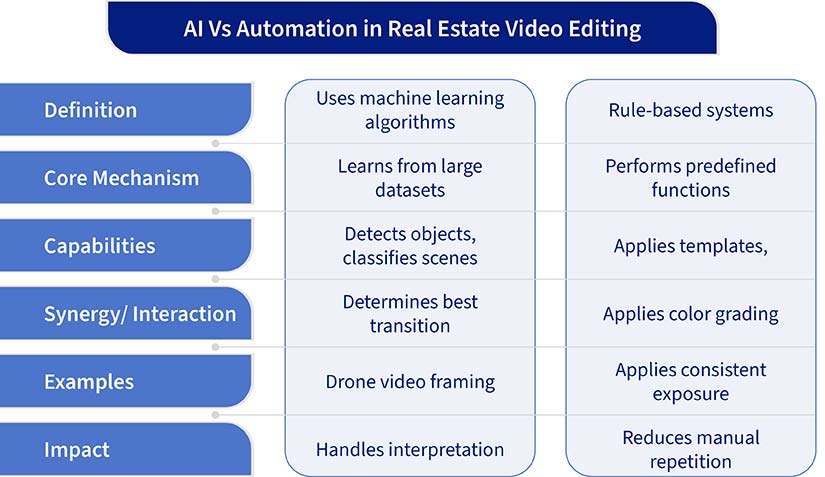
For example, in a drone video, AI can identify property boundaries and automatically adjust framing to keep the subject centered. In virtual tours, they can differentiate between rooms and optimize navigation logic. Automated tools then execute transitions, apply consistent exposure, and generate multiple format outputs optimized for web and social.
Together, they reduce manual effort, accelerate workflows, and improve consistency. In real estate, this integration enables faster production of high-quality, context-aware videos that enhance buyer engagement and streamline marketing operations.
This synergy of AI and automation transforms post-production from a manual editing process to a data-driven pipeline, delivering scalable, consistent, and professional-grade real estate videos. Together, AI and automation make professional-grade video editing faster, more accessible, and scalable for creators of all skill levels.
Scale Your Property Video Production with AI-Powered Editing
Streamline your post-production, reduce turnaround time, and deliver high-quality videos that convert.
The role of AI and automation in real estate video editing
AI and automation are crucial in real estate video editing due to their transformative impact on efficiency, cost, and market engagement. They automate real estate video editing tasks like cutting, color correction, and audio enhancement, saving up to 80% in production costs, and potentially up to 98% per video.
And that’s not all. Apart from efficiency, AI improves video quality and consistency, enhancing visuals by up to 83%. This leads to higher engagement, and listings with professional video receive 118% more engagement and 403% more inquiries, selling the properties up to 31% faster. Virtual tours edited and post-processed using automation further boost buyer interest and shorten sales cycles.
So, let’s check out the impact of AI and automation on real estate video editing.
1. AI and automation enhance real estate video quality
AI and automation enhance real estate video quality by applying precision and efficiency to core editing tasks. Automation accelerates these processes by applying corrections consistently across large volumes of footage. Together, they deliver professional-grade videos that highlight property features with clarity and consistency that is critical for engaging remote buyers and maintaining a competitive edge in visually driven real estate marketing.
-
AI-powered noise reduction and audio enhancement
AI models isolate speech from ambient noise and automatically balance levels, ensuring audio clarity in walkthroughs, interviews, and drone footage, even in uncontrolled environments.
-
Intelligent stabilization and camera shake removal
AI detects motion patterns and corrects unwanted camera shake, which is crucial for both handheld and drone footage, resulting in smooth, watchable videos.
-
AI-driven upscaling and resolution enhancement
Machine learning enhances video resolution by adding detail and reducing compression artifacts, allowing standard footage to meet 4K requirements for modern displays and high-definition marketing platforms.
-
Smart object removal (e.g., unwanted reflections, distractions)
AI identifies and removes visual noise like reflections, shadows, or moving people preserving core property visuals and ensuring the focus remains on architectural and spatial elements.
2. Streamlining the property video editing workflow
AI and automation streamline real estate video editing by eliminating manual and repetitive processes. They accelerate turnaround times, reduce human error, and ensure consistent quality, especially in high-volume editing environments like real estate listings, where speed and brand consistency directly impact marketability and lead generation.
-
Automated scene detection and tagging
AI parses video footage to detect scene changes, classify content types, and apply metadata tags, enabling structured editing, indexing, and clip retrieval.
-
AI-assisted rough-cut generation and intelligent trimming
AI identifies key visuals and audio segments, removes irrelevant frames, and is effective at video length optimization.
-
Automated subtitling and transcription
Speech recognition generates and integrates accurate subtitles and searchable transcripts, improving accessibility and viewer comprehension.
-
Pre-set templates and automated branding integration
Automation applies branded templates, inserts logos, and syncs watermarks at scale while ensuring consistency across listing platforms and accelerating high-volume video production workflows.
Bring Speed, Precision, and Consistency to Your Real Estate Videos
Let our experts and automation tools help you deliver high-volume, high-quality videos, on time, every time.
3. Advanced color grading and visual consistency
AI and automation ensure visual consistency across real estate videos by standardizing color grading and enhancing footage quality. This process ensures that walk-throughs, drone footage, and virtual tours maintain a professional appearance, improve viewer experience, and meet the visual standards expected on real estate platforms and social channels.
-
AI-powered color matching across different clips and cameras
AI analyzes color profiles and lighting conditions, then automatically adjusts tones across footage to ensure seamless visual consistency between interior, exterior, and aerial shots.
-
Automated adjustments for optimal brightness, contrast, and saturation
Algorithms dynamically tune exposure, contrast, and saturation for each scene, correcting underexposed footage and balancing color intensity for a clean, polished visual output.
-
Style transfer for consistent visual aesthetics
Predefined visual styles are applied using machine learning, ensuring branding alignment and maintaining a uniform cinematic look across multiple property videos and marketing platforms.
4. Personalization and customization
AI and automation enable deep personalization in real estate video editing by dynamically tailoring content to specific audiences and property types. This blend ensures every video feels tailored while maintaining production efficiency and brand cohesion across platforms, enhancing viewer engagement, and supporting targeted real estate marketing strategies at scale.
-
AI driven dynamic text overlays and graphics
AI tools generate context-aware text overlays highlighting room features, dimensions, or amenities, while syncing animated graphics to key visual cues in walkthroughs or tours.
-
Automated insertion of property addresses and agent introductions
Metadata extraction allows automation to embed property addresses, MLS details, and agent intros consistently, eliminating manual entry and aligning with branding and regional compliance requirements.
-
Intelligent recommendations for background music and sound effects
Machine learning models analyze tone, pace, and visual style to recommend licensed audio tracks, ensuring mood-aligned soundscapes that enhance engagement without distracting from visual content.
Top 5 benefits of leveraging AI and automation for real estate video editing
AI and automation in real estate video editing have proved their worth in fast-tracking turnaround times, reducing manual tasks, and ensuring consistent branding. Also, it minimizes editing overheads and enhances video quality through stabilization, noise reduction, and upscaling, ultimately leading to significant cost reduction. Scalable automated workflows are capable of handling high video volumes efficiently and support growing property portfolios, hence a boon for real estate companies.
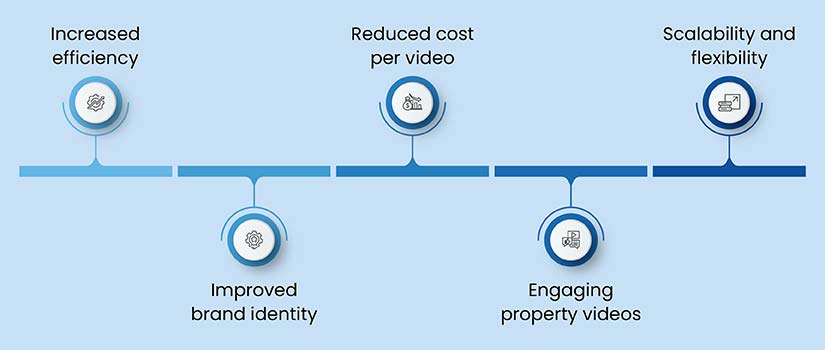
Let’s check a few more benefits of using AI and automation for property video editing.
1. Increased efficiency and faster turnaround times
Tasks, including scene detection, music syncing, trimming and exporting, are some of the prominent manual bottlenecks that AI and automation eliminate to a great extent. These technologies empower real estate video editors to process and deliver voluminous footage from days to hours. Automated batch processing and templated workflows allow real estate teams to scale video production without increasing the editing time or resources – proportionately.
2. Improved consistency and brand identity
Consistent color grading, font treatment, logos, and visual styles across all videos are mandatory to reinforce brand identity and ensure that viewers instantly associate the content with the realtor, real estate company, or the property listing site. AI-powered editing tools seamlessly make this happen. Different editors or ad hoc workflows are known for creating variations that are easily taken care of by automated brand presets. This helps maintain consistent visual language across all listings, resulting in increased recognition and credibility.
3. Reduced cost per video
Completing repetitive tasks algorithmically using automation reduces dependency on large in-house video editing teams. Using automated tools, instead of hiring multiple video editors for video corrections or logo insertions, helps realtors attain the same output but with a lower overhead. This shift in the last few years has minimized the cost per video and empowered many real estate firms to invest more in lead generation and marketing activities. Efficient workflows also reduce time-related costs tied to revision cycles and deadline overruns.
4. Higher quality and more engaging real estate videos
Manual enhancement of raw property footage presents many challenges when working at scale. Stabilizing shaky camera work, upscaling low-resolution content, and removing unwanted objects from video require considerable time and expertise. AI technology transforms this process. Automated systems can quickly enhance raw property videos while maintaining consistent quality standards. These improvements help listings capture attention on competitive platforms.
Automated enhancement goes beyond basic corrections. Dynamic text overlays highlight key property features. Visual cues guide viewers through important spaces. Music synchronization creates immersive viewing experiences. These elements work together to produce high-quality videos that connect with potential buyers and prompt faster inquiries.
5. Scalability and handling large volumes of video content
Processing multiple property videos simultaneously without quality loss was a persistent challenge before AI automation became available. Real estate agencies handling frequent uploads and listing platforms and managing thousands of properties now benefit from automated tagging, segmentation, and standardization. Bulk processing capabilities help businesses meet growing video demand while scaling operations effectively. This helps creative editors oversee the process while automation manages high-volume production requirements.
The role of human expertise in the age of AI and automation
AI and automation have become standard solutions for speed optimization and accuracy. However, these technologies have their own limitations. They cannot replace human expertise in video production.
Technology excels at handling repetitive tasks. But creative judgment remains essential, something only skilled video editors possess. Video editing experts define narrative structure, establish visual tone, and ensure alignment with branding and marketing objectives.
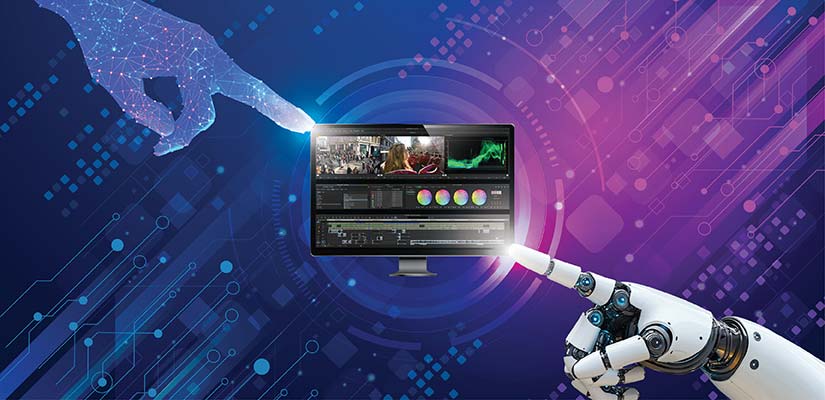
Our real estate video editing workflows treat AI as an assistive tool, not a replacement. Video editors guide output quality, refine AI-generated content, and correct contextual errors that automation cannot resolve. From selecting focal points in walkthrough videos to creating compelling virtual tour sequences, human oversight ensures clarity and emotional impact.
As an experienced real estate video company, we have discovered that collaborative approaches prove both viable and beneficial. AI handles technical precision, while human editors shape the story. This blend of human supervision and automation produces real estate videos that are technically consistent and visually compelling.
Trends in AI and real estate video editing to watch
The fast-growing capabilities of AI and automation are setting up a completely new future of real estate video editing.
- Hyper-personalization is at the forefront of all the trends as AI engines are increasingly becoming capable of tailoring content based on buyer profiles. For example, videos for luxury buyers will focus on high-end finishes and skyline views, whereas videos for families might focus more on spacious kitchens and backyards.
- Predictive analytics is increasingly enabling AI to suggest edits that are in tune with market behavior. If virtual staging is trending in any of the regions, AI will automatically prioritize those features in the editing process.
- Apart from hyper-personalization and predictive analytics, another trend setter is real-time editing. It is becoming standard practice. On the fly, video revisions, as part of real-time editing, backed by cloud-based tools to enable revisions during property shoots, enabling faster production cycles and instant feedback loops.
These developments point toward more adaptive, data-driven, and efficient workflows that empower real estate professionals to stay competitive while delivering content that resonates with specific buyer segments. The shift is not just technological but strategic, and it enables smarter marketing through AI-enhanced storytelling.
Conclusion
AI and automation are changing real estate video editing from a manual process to a data-driven one. For real estate professionals, this means more time and cost savings, better video quality and more engagement. Properties benefit big time, get more inquiries, and sell faster, directly increasing your ROI and market share. The future of real estate videos is powered by AI and will be even more immersive and personal. We will be at the forefront of it all, innovating to define success in tomorrow’s digital property landscape.
Stay ahead with scalable, automated editing for real estate brands.
Outsource smarter. Boost video quality, reduce cost, and scale fast with AI-powered editing services.




